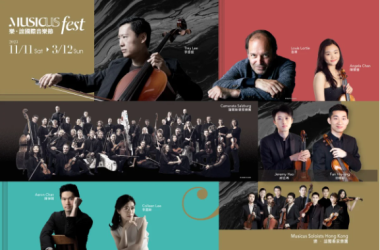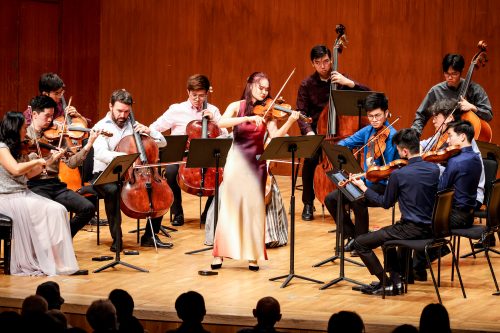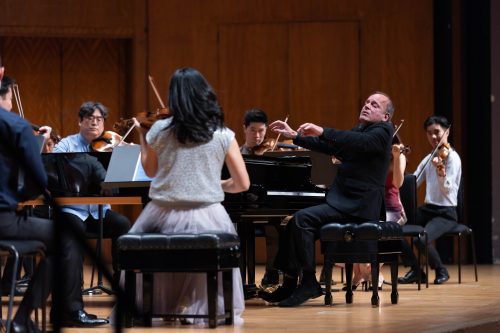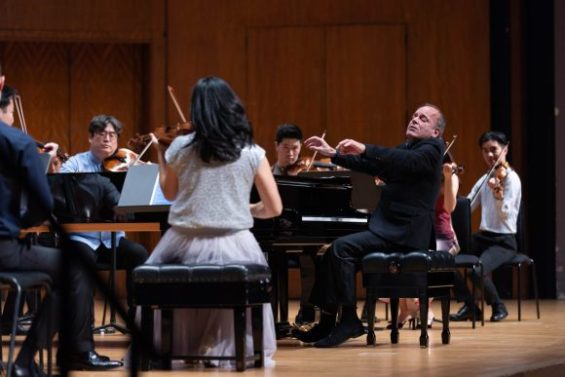 Hong Kong Various, Musicus Fest 2023 – Louis Lortie and Musicus Soloists Hong Kong: Louis Lortie (piano), Angela Chan (violin), Musicus Soloists Hong Kong. Concert Hall, Hong Kong City Hall, 21.11.2023. (TM)
Hong Kong Various, Musicus Fest 2023 – Louis Lortie and Musicus Soloists Hong Kong: Louis Lortie (piano), Angela Chan (violin), Musicus Soloists Hong Kong. Concert Hall, Hong Kong City Hall, 21.11.2023. (TM)

Nielsen – Little Suite for Strings, Op.1
Sibelius – Romance in C for String Orchestra, Op.42 and Impromptu for String Orchestra, Op.5
Pärt – Fratres for Violin, Strings and Percussion
Grieg – Piano Concerto in A minor, Op.16 (version for string orchestra)
With the inauguration of Musicus Fest in 2013, Hong Kong’s Musicus Society began translating its ideals of cross-cultural and intergenerational collaboration into the reality of performance in a festival atmosphere.
Artistic director Trey Lee, an internationally acclaimed cellist born in Hong Kong and based in Berlin, was motivated to found Musicus Society by a desire to bring the talented musicians of his native city into the spotlight. Lee designed this year’s edition of Musicus Fest around interactions between young artists from Hong Kong and eminent guests visiting from the West. Thus he invited the French-Canadian pianist Louis Lortie not only to appear as the soloist but to serve as guest artistic director and mentor for this opening programme.
Lortie, who has performed widely across Asia, was joined by a handful of string soloists visiting from abroad to coach and play side-by-side with the members of Musicus Soloists Hong Kong (MSHK), a new ensemble initiated by Lee and introduced at last year’s Musicus Fest. MSHK comprises young string soloists and chamber musicians originating from Hong Kong — many of whom are currently studying in leading conservatories around the world — and combines two related aspects of Musicus Society’s mission. On the one hand, this flexible collective of emerging artists benefits from the exchanges Musicus facilitates with experienced figures in the field. MSHK is moreover intended to give Hong Kong an international musical profile, representing the city through performances abroad. The ensemble made its European debut this past spring with performances in Berlin and Weimar.
The first and most lasting impression these young musicians made transcended issues of technical control and ensemble cohesion — though they often astonished on that level, even when, inevitably, some points needing a tighter focus also became apparent. What stood out, above all, was their palpable joy in the give-and-take of live performance, in the surprising revelations and delighted discoveries that accompanied the act of putting a stamp of their own on the music.
Rather than settle for a cloned reiteration of safe classics, the MSHK players braved a programme of unusual choices requiring great concentration. Lortie curated a menu of Nordic composers in lieu of predictable fare for string orchestra. As he pointed out in an interview following rehearsal: ‘This is the Antipodes of what you would feel here in Hong Kong, if you don’t know anything about snow and cold. It’s a different world, emotionally, but I think there’s a lot they can take in that is different from what they would learn playing the standard chamber ensemble repertoire’.
The concert’s opening work, Carl Nielsen’s Little Suite for Strings from 1888 (the Danish composer’s very first published opus), faltered at times due to uncertain ensemble coordination. It took a bit of warming up before the piece could find its stride — which it undeniably did in the graceful middle movement waltz and the exuberantly charged finale (tagged by the composer ‘The Bacchus Procession’).
The Little Suite’s melancholy underpinnings paved the way for the exquisitely pared-down, introspective sound world of Sibelius’s Op.5 Impromptu, a piece for string orchestra crafted from a pair of his early piano miniatures. Also notable was MSHK’s account of the Finn’s Romance in C from the period of the first version of the Violin Concerto. Guest concertmaster Elissa Lee, visiting from Canada and one of the mentoring collaborators invited by Musicus, coaxed myriad nuances of shaded playing from the ensemble. Also on hand were Korean violist Sang-Jin Kim and Australian cellist Martin Smith.

A dramaturgical arc toward an inner world of contemplation took its most radical turn with the mystical resonances of Arvo Pärt’s breakthrough Fratres. Of its multiple instrumental incarnations, Lortie chose the version for solo violin, string orchestra and solo percussionist. Taking the spotlight as the solo violinist was Musicus Society young artist Angela Chan (currently finishing her master’s degree at the New England Conservatory).
She emphasised the dualism of Pärt’s sound world, toggling between passionate intensity in the arpeggiations — the churn of Samsara — and a withdrawn, above-the-battle ecstasy, clear as an azure sky, that was beautifully mirrored by the ensemble’s drawn-out harmonics, with Alvin Chan (guest artist on percussion) adding otherworldly tonal colours.

Familiar as it may seem from a programme listing, the work featured on the second half of the concert had much novelty to offer in its chamber context. The freshness Lortie brought to his interpretation, along with the lively exchange of ideas with the MSHK players, gave Grieg’s Piano Concerto a good deal more than a facelift. In several remarkable passages, it actually seemed to be a different piece altogether than the archetypical Romantic warhorse.
They played a pre-existing arrangement of the orchestral parts for strings alone. Thus the timpani’s ominous thunder that sets the concerto in motion was transmogrified into a mysterious cloud of low-string tremolos. Seated with his back to the audience before his open-winged Steinway so he could conduct the ensemble, Lortie produced a big, resonant sound, the famous cascade of opening chords glinting like crystals. Expected motifs reclothed in new voicings and textures encouraged a kind of auditory rubbernecking, while the more inward-looking moments of Grieg’s rhetoric brought to mind the wistful tone of the selections on the first half.
Proportions, too, felt different — revelatory. Lortie’s balancing of left and right hand was a study in articulate virtuosity, but it never seemed an end in itself: the first-movement cadenza conveyed the dimensionality of a Shakespeare monologue. I especially relished the intimacy and dialogue with the ensemble, such as the moment of anticipation at the cadenza’s conclusion.
The Adagio radiated a rare loveliness that resonated, dramaturgically, with the Pärt, and the rhythms of the finale flashed with passion as well as precision.
But it was again the contemplative note that Lortie chose to conclude the evening, leading a tenderly nuanced account of the Largo from Bach’s F minor Keyboard Concerto, BWV 1056 — each ensemble pizzicato thoughtfully weighted, indispensable to the pianist’s magically spun line.
Thomas May
